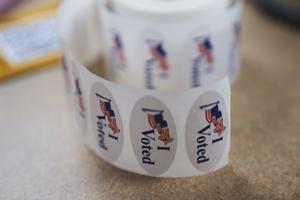
News
November 01, 2025
Federal judge rules Trump can't require citizenship proof on the federal voting form
Democratic and civil rights groups sued the Trump administration over Trump's executive order that sought to overhaul U.S. elections.
**Federal judge rules Trump can't require citizenship proof on the federal voting form**
A federal judge has struck down a key provision of a Trump-era executive order aimed at overhauling U.S. elections, ruling that the administration cannot require proof of citizenship on the federal voter registration form. The decision comes after a lawsuit filed by several Democratic and civil rights organizations challenging the legality of the directive.
The contested executive order, issued during Donald Trump’s presidency, sought to add a requirement for individuals to provide documentary proof of U.S. citizenship when registering to vote using the national form. This form is used in states that allow it and is intended to simplify the voter registration process, especially for those who move frequently.
Opponents of the requirement argued that it would disproportionately disenfranchise eligible voters, particularly naturalized citizens and those from marginalized communities who may face challenges in readily accessing or providing citizenship documentation. They further contended that the requirement exceeded the authority granted by the National Voter Registration Act (NVRA), also known as the "Motor Voter" law, which aims to ease voter registration procedures.
The judge's ruling sided with these arguments, finding that the Trump administration lacked the legal basis to unilaterally impose the citizenship proof mandate on the federal form. The decision emphasized that the NVRA already outlines specific requirements for voter registration and that adding additional burdens without congressional authorization is unlawful.
The plaintiffs in the case celebrated the ruling as a significant victory for voting rights. They argued that the decision protects the integrity of the electoral process by ensuring that eligible citizens are not unjustly denied the right to vote due to unnecessary bureaucratic hurdles.
The Justice Department, which defended the Trump administration's policy, has not yet indicated whether it will appeal the ruling. The decision marks the latest in a series of legal battles surrounding voting rights and election administration, highlighting the ongoing debate over access to the ballot box and the role of the federal government in regulating elections. The ruling underscores the importance of adhering to existing federal laws, such as the NVRA, in maintaining a fair and accessible voting system for all eligible Americans.
A federal judge has struck down a key provision of a Trump-era executive order aimed at overhauling U.S. elections, ruling that the administration cannot require proof of citizenship on the federal voter registration form. The decision comes after a lawsuit filed by several Democratic and civil rights organizations challenging the legality of the directive.
The contested executive order, issued during Donald Trump’s presidency, sought to add a requirement for individuals to provide documentary proof of U.S. citizenship when registering to vote using the national form. This form is used in states that allow it and is intended to simplify the voter registration process, especially for those who move frequently.
Opponents of the requirement argued that it would disproportionately disenfranchise eligible voters, particularly naturalized citizens and those from marginalized communities who may face challenges in readily accessing or providing citizenship documentation. They further contended that the requirement exceeded the authority granted by the National Voter Registration Act (NVRA), also known as the "Motor Voter" law, which aims to ease voter registration procedures.
The judge's ruling sided with these arguments, finding that the Trump administration lacked the legal basis to unilaterally impose the citizenship proof mandate on the federal form. The decision emphasized that the NVRA already outlines specific requirements for voter registration and that adding additional burdens without congressional authorization is unlawful.
The plaintiffs in the case celebrated the ruling as a significant victory for voting rights. They argued that the decision protects the integrity of the electoral process by ensuring that eligible citizens are not unjustly denied the right to vote due to unnecessary bureaucratic hurdles.
The Justice Department, which defended the Trump administration's policy, has not yet indicated whether it will appeal the ruling. The decision marks the latest in a series of legal battles surrounding voting rights and election administration, highlighting the ongoing debate over access to the ballot box and the role of the federal government in regulating elections. The ruling underscores the importance of adhering to existing federal laws, such as the NVRA, in maintaining a fair and accessible voting system for all eligible Americans.
Category:
World